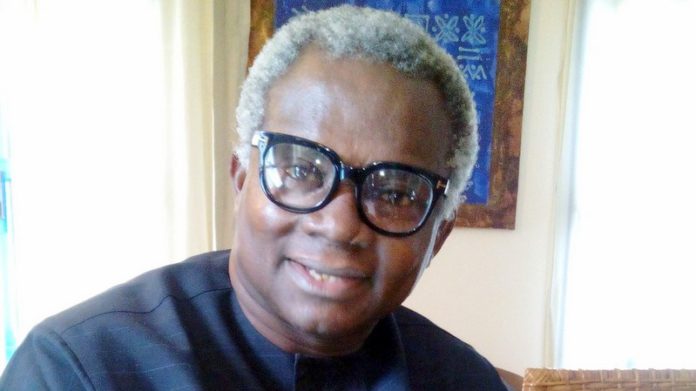Why the crass breach of the constitution by governors at grassroot level is nauseating is because a lot of patriots are erroneously assuming that democracy as the driver of the global world order which transformed Europe, North America and other democratic nations has failed in Nigeria.
By Osita Okechukwu
Without being contemptuous of court process, kindly permit me to express my utter anguish over the unholy war being waged yearly against our innocent democracy at the grassroot level by alliance of all state governors who more or less ape emperors.
The bone of contention is how our authoritarian state governors trampled, mangled and strangulated our local government councils, contrary to Section 7(1) of the 1999 Constitution of the Federal Republic of Nigeria as amended, which states inter alia: “The system of local government by democratically elected local government councils is under this Constitution guaranteed…….” Hence denial of rural citizenry the dividends of democracy.
It is also pertinent to note that the emperor-governors in addition stifled the State Independent Electoral Commission (SIEC), a body charged to organise, supervise and conduct transparent, free and fair elections.
The outcry today is that SIEC should be scrapped because of its abysmal performance, to be exact in 98% of all elections it conducted the ruling party of the given state wins all councilorship seats.
This is why the strident agitation for its annulment and transfer of its functions to Independent National Electoral Commission (INEC) garnered consensus and to the extent that the Attorney General of Federation few days after his suit, called at a national dialogue organised by the House of Representatives for the scrapping of SIEC.
“Many have proposed that there is need for scrapping the state electoral commission. Their functions and powers should be transferred to the Independent National Electoral Commission (INEC) because the state independent electoral commission remains an appendage of the incumbent governor and it behaves as such.
READ ALSO:
Shehu Sani accuses PDP, LP, other opposition lawmakers of complacency
Going further he opined, “I have not seen any state where local government election is conducted, however poorly the governor may have performed that will not return the members of the political party as winners of the election.”
INEC no doubt is not perfect, as there are complaints trailing some of its elections; however it has in the 25 years of civil rule to the degree of 180% performed better in the scale of analysis and hence generated consensus and far more confidence than SIEC.
Also put in harm’s way is good governance which could have been engendered if the overall discharge of functions of checks and balances at the sub-national by the State Judiciary and State Legislatures, was not morphed by the banditry mode of the governors.
This is even after the 4th constitutional amendment of the 8th National Assembly under Distinguished Senator Bukola Saraki as Senate President, whereby President Muhammadu Buhari’s assent obliged thus in Section 121(3),
“Any amount standing to the credit of the Judiciary in the Consolidation Revenue Fund of the State shall be paid directly to the heads of the courts concerned.”
The emperor-governors willfully neglected this golden amendment which could have tremendously advanced democratic ethos to all the nooks and crannies of our dear country.
In anger President Buhari signed Executive Order 10 to muscle them so as to allow the state judiciary and state legislatures to breathe, by granting financial autonomy to the legislatures and the judiciary in the 36 states of the federation.
Here is Executive Order 10 excerpts, “Implementation of financial autonomy for state legislature and judiciary 2020’, had provided that in the event of failure of any state government to release the allocations due their legislature or judiciary, the Accountant General of the Federation should deduct the allocation from source and pay it to the legislature and the judiciary in the defaulting states.”
Before you could count ten, all the governors ganged up and headed to the Supreme Court, where they vehemently challenged Executive Order 10.
And fortunately for them six out of the seven justices led by Justice Mohammed Musa Dattijo argued that the contentious Executive Order 10 violated the provisions of the 1999 Constitution, which stipulates the functions of and powers of each arm of government.
“The country is still a federation and the 1999 Constitution it operates is a clear delineation of powers between state and the Federal Government. The President has overstepped the limit of his constitutional powers by issuing the Executive Order 10. The country is run on the basis of the rule of law.” – Dattijo submitted.
The lone dissenting judgement of Justice Uwani Abba-Aji supported Executive Order 10. “The action of the president is justifiable taking into consideration the hanky-panky subterfuge played by state governors against the independence and financial autonomy of state judiciary.
It is a pitiable eyesore what judicial officers and staff go through financially at the hands of state executives, who often flout constitutional and court orders to their whims and caprices.”
Luckily as one had always mused in different fora, change sometime comes from unexpected quarters. Indeed, a Daniel has come to judgment in Asiwaju Bola Tinubu, the 5th President of the 4th Republic and 16th since independence, who took the bull by the horn, mustered the political will and took the gauntlet of unmasking the emperor-governors as barefaced anti-democrats. Mr. President exhibited uncommon passion to retrieve our innocent democracy at the grassroots from their claws.
Why the crass breach of the constitution by governors at grassroot level is nauseating is because a lot of patriots are erroneously assuming that democracy as the driver of the global world order which transformed Europe, North America and other democratic nations has failed in Nigeria.
Their fallacy of generalisation was that it was democracy which failed, not the managers whom the good people of Nigeria freely voted for.
This assumption like all mother of mistakes was conceived without proper diagnosis of the material conditions which generated the obstacles against democratic growth in the first place.
Recently our elder statesman and two-time president, iconic Chief Olusegun Obasanjo like many others was engulfed in the romanticism of how best to structure a new model of democracy best suitable to us Africans opined,
“African countries must discard the liberal democracy introduced to the continent by the Western countries
and practice a form of Afro democracy”.
Little did Obasanjo realise that his earlier romanticism of one-party state and 3rd Term Agenda during his opportune time in power, in cohort with governors loyal to him was akin to unleashing nuclear weapons railed against liberal democracy.
Ironically the High Chief today erroneously holds strong view that liberal democracy is neither unworkable nor adaptable in Africa. He smartly brushed aside the truism that he worked against the adherence to democracy, in particular the constitutional provision that democratically elected local government councils in Nigeria is guaranteed. This is the disease not the symptoms our elder statesman is fingering.
Methinks there is no better Afro-democracy without the beacons of democracy – rule of law, popular participation, freedom of speech, freedom of assembly, and free and fair elections.
In this context, wittingly or unwittingly they stymied local government councils in the early days of the 4th Republic, albeit the morning they say shows the day’s weather.
This anti-democratic push was gazetted when Obasanjo assented to 2001 Electoral Act, hatched by his clan of governors who ingloriously intended to shift local elections to God knows when. Then Obasanjo had the yam and the knife, was the cynosure with cult followership of governors, in fact those outside his camp were severely punished.
Fortunately, the ill-fated 2001 Electoral Act was nullified by the Supreme Court. Here is the judgment Justice Idris Kutigi then presented unanimously on behalf of the seven honourable justices inter alia:
“No law enacted by the National Assembly can validly increase or otherwise alter the tenure of office of elected officers or as chairmen and councillors of local government councils in Nigeria…..
The Electoral Act as a whole was a mix-up, a confusion, because the National Assembly seemed to have treated its legislative powers with respect to federal election as if they were co-extensive with its powers over local government election,”
As fortune would have it Mr. President ran to the same Supreme Court which the governors resorted to and mandated his Attorney General, Honourable Lateef Fagbemi to seek the relief of a declaration that local government is entitled to a direct payment from the federation account of the amount standing to its credit in the said federation account, where the state government has persistently refused or failed to pay to it the said amount received by the state government on its behalf.
Some pundits have queried why is it only the first line charge of funding of the state judiciary, state legislatures and local government councils that Executive Order 10, and the Supreme Court case addressed?
The answer simply is one, that the Supreme Court cannot amend the constitution going by the doctrine of separation of powers and secondly that the governors have not even obeyed the provision of the constitution that guaranteed democratically elected local government councils.
Therefore, the best is to subtly deny the governors the financial powers, the handgun they utilise to manipulate the judges, legislators and council chairmen. As the sage says, he who pays the piper dictates the tune and money is the root of all evil.
There is general consensus that democracy will flourish better when each arm of government and each organ is financially independent. For we have witnessed the arrogance of the governors and instances where they brag when they for instance buy SUV Jeeps for judges as if they are dashing them with their personal fortunes.
On the table is the crucial question whether democracy is the culprits or as a matter of fact, who actually are the culprits of the nagging question of recession of democracy in our dear country? How do we reconcile that after the registration of over 90 million voters less than 30 million trooped out on the voting day to vote. Or a scenario where people are questioning whether democracy has lost the capacity to advance peace, unity and prosperity as envisioned by Chapter Two of our Constitution – Fundamental Objectives and Directive Principles of State Policy. A chapter which captured the social contract between our leaders and the led simply in two words proviso – security and welfare.
Accordingly, in league with other patriots one looks forward to the legal battle ahead between democrats and anti-democrats and most importantly between crusaders for the advancement of good governance via democracy and those who unconsciously are pushing for the recession of democracy in our clime hoping for elusive better option.
Osita Okechukwu, erstwhile Director General, Voice of Nigeria (VON)













